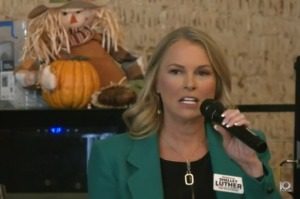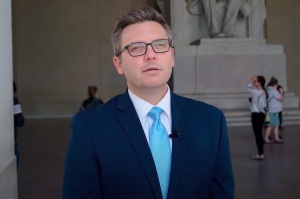The Politics of Batman: Is Romney Bane or Wayne?
Spoiler Alert: Scenes from the film "The Dark Knight Rises" are discussed in this article.
Politics has collided with pop culture recently as commentators have drawn connections between Bane, the villain in the new Batman movie, "The Dark Knight Rises," and Republican presidential candidate Mitt Romney. Others, however, have said that Romney is more like the film's hero: Bruce Wayne, the billionaire who fights crime in a bat suit.
"It has been observed that movies can reflect the national mood," Democratic adviser and former Clinton aide Christopher Lehane told The Washington Examiner. "Whether it is spelled Bain and being put out by the Obama campaign or Bane and being out by Hollywood, the narratives are similar: a highly intelligent villain with offshore interests and a past both are seeking to cover up who had a powerful father and is set on pillaging society."
Bain Capital is the company founded by Romney. The company has been central to the Obama campaign's attacks on Romney. Bain Capital's investments demonstrate that Romney is a "pioneer in outsourcing," the Obama campaign has charged, suggesting that Romney is more concerned about making money than the good of the country.
Conservative talk radio host Rush Limbaugh also noticed the Bane/Bain homonym and suggested that Democrats are hoping the connection will hurt Romney in the election.
"A lot of people are gonna see the movie, and it's a lot of brain-dead people, entertainment, the pop culture crowd, and they're gonna hear Bane in the movie and they're gonna associate Bain. The thought is that when they start paying attention to the campaign later in the year, and Obama and the Democrats keep talking about Bain, Romney and Bain, that these people will think back to the Batman movie, 'Oh, yeah, I know who that is,'" Limbaugh said as he laughed. "There are some people who think it'll work. Others think you're really underestimating the American people to think that will work."
Chuck Dixon, the comic book writer who created Bane in the 1990's, did not like the idea of comparing his villainous creation to Romney. Calling himself a "staunch conservative," Dixon said that Bane is more of a "Occupy Wall Street type" and Romney is more like Bruce Wayne, a billionaire philanthropist out to save his city.
Conservative columnist Christian Toto believes that the film is influenced by director Christopher Nolan's "disgust at Occupy Wall Street."
In the movie, the villains constantly mock the wealthy. When they take over the city, the "upper crust" are put on trial and sentenced to death. Bane's first act of terrorism takes place at a symbol of wealth and privilege – the Gotham Stock Exchange.
"This is the stock exchange. There is no money here," Bane is told.
"Really? Then why are you people here?" Bane, played by Tom Hardy, asks.
The movie "never mentions the 99 percent or other overt Occupy Wall Street slogans," Toto writes. "But Nolan clearly summons the spirit of the ragtag movement with a propensity for violence."
"We came here not as conquerors, but as liberators, to return control of this city to the people. Tomorrow, you claim what is rightfully yours," Bane tells the people of Gotham as he takes control of the city with a nuclear weapon.
Selina Kyle, aka "Catwoman," played by Anne Hathaway, also disparages the wealthy.
"You're all going to wonder how you ever thought you could live so large and leave so little for the rest of us," she tells Wayne, played by Christian Bale.
After Wayne goes bankrupt (partly on a failed clean energy project) he tells Kyle that he was allowed to keep his house.
"The rich don't even go broke like the rest of us," Kyle mocks.
Mark Fisher, author of Capitalist Realism: Is There No Alternative?, also noticed many of the anti-Occupy themes, but disparages the film for criticizing protests against excesses of capitalism.
"The sustaining fantasy of Nolan's Batman films – which does chime uncomfortably with Romney – is that the excesses of finance capital can be curbed by a combination of philanthropy, off-the-books violence and symbolism," Fisher wrote for The Guardian.
"The Dark Knight at least exposed the duplicity and violence necessary to preserve the fictions in which conservatives want us to believe. But the new film demonizes collective action against capital while asking us to put our hope and faith in a chastened rich."




























